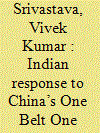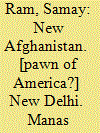| Srl | Item |
| 1 |
ID:
075271


|
|
|
| 2 |
ID:
147995


|
|
|
|
|
| Summary/Abstract |
Indian response to China’s One Belt One Road is well structured and is largely governed by the soft power approach. Chinese policy is solely dependent upon the economic interests whereas the India policy starts with soft power diplomacy but is also aimed to reach to develop the close economic-political relationships with the targeted countries. Indian response is more practical and is based on the understanding the needs of the concerned countries. The start has been made with simple efforts as the maritime cooperation, interaction at the trade discussion level.
|
|
|
|
|
|
|
|
|
|
|
|
|
|
|
|
| 3 |
ID:
156576


|
|
|
|
|
| Summary/Abstract |
China has stepped up as a new leader of world economic order as President Xi Jinping accelerates China’s efforts to do business with the world . After developing its economy and military power, China is now rising as an expansionist and antagonistic power.
|
|
|
|
|
|
|
|
|
|
|
|
|
|
|
|
| 4 |
ID:
054740


|
|
|
|
|
| Publication |
New Delhi, Manas Publications, 2004.
|
| Description |
221p.hbk
|
| Standard Number |
8170491894
|
|
|
|
|
|
|
|
|
|
|
|
Copies: C:1/I:0,R:0,Q:0
Circulation
| Accession# | Call# | Current Location | Status | Policy | Location |
| 048879 | 958.1046/RAM 048879 | Main | On Shelf | General | |
|
|
|
|
| 5 |
ID:
150808


|
|
|
|
|
| Summary/Abstract |
Terrorists, irrespective of their country, class and culture, form
one community so far as their basic functions are concerned.
Primarily, they intend to wage a psychological war and strike
terror through assassinations or bomb explosions. The terrorists
also aim to inflict material destruction by destroying and
damaging the enemies’ utilities, communication networks and
industries, thereby attacking the economic structure of the
country. A government confronted with the terrorist challenge
may adopt a soft, compromising view on one hand and a tough
non-confessional authoritarian stand on the other. The result is
that many times, the public itself develops a hard, non-resistant
attitude towards the government for its apparently diffused
policies.
The Indian response to terrorism needs to reckon with
some of its structural inadequacies in order to evolve into an
effective strategy; primary among these are the psyche of a multiethnic
society that stands easily vulnerable to exploitation by
terror elements, which is even more accentuated by disparate
economic development in which poverty -stricken youth are often
hired to fight a war they have little to gain from.
|
|
|
|
|
|
|
|
|
|
|
|
|
|
|
|